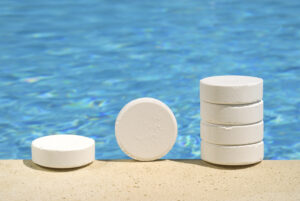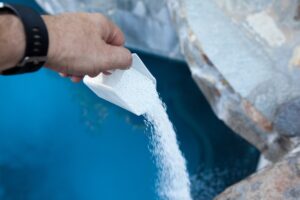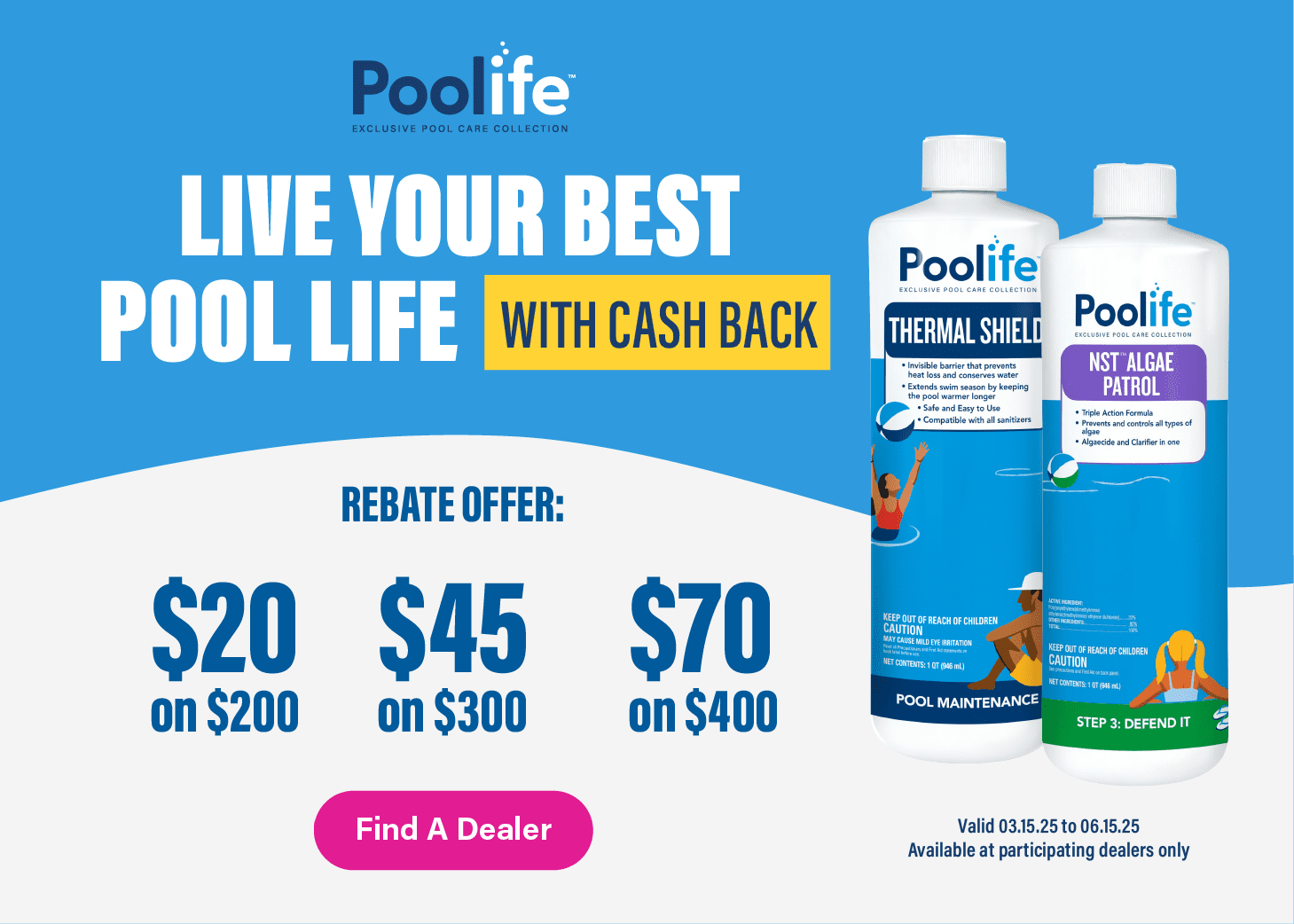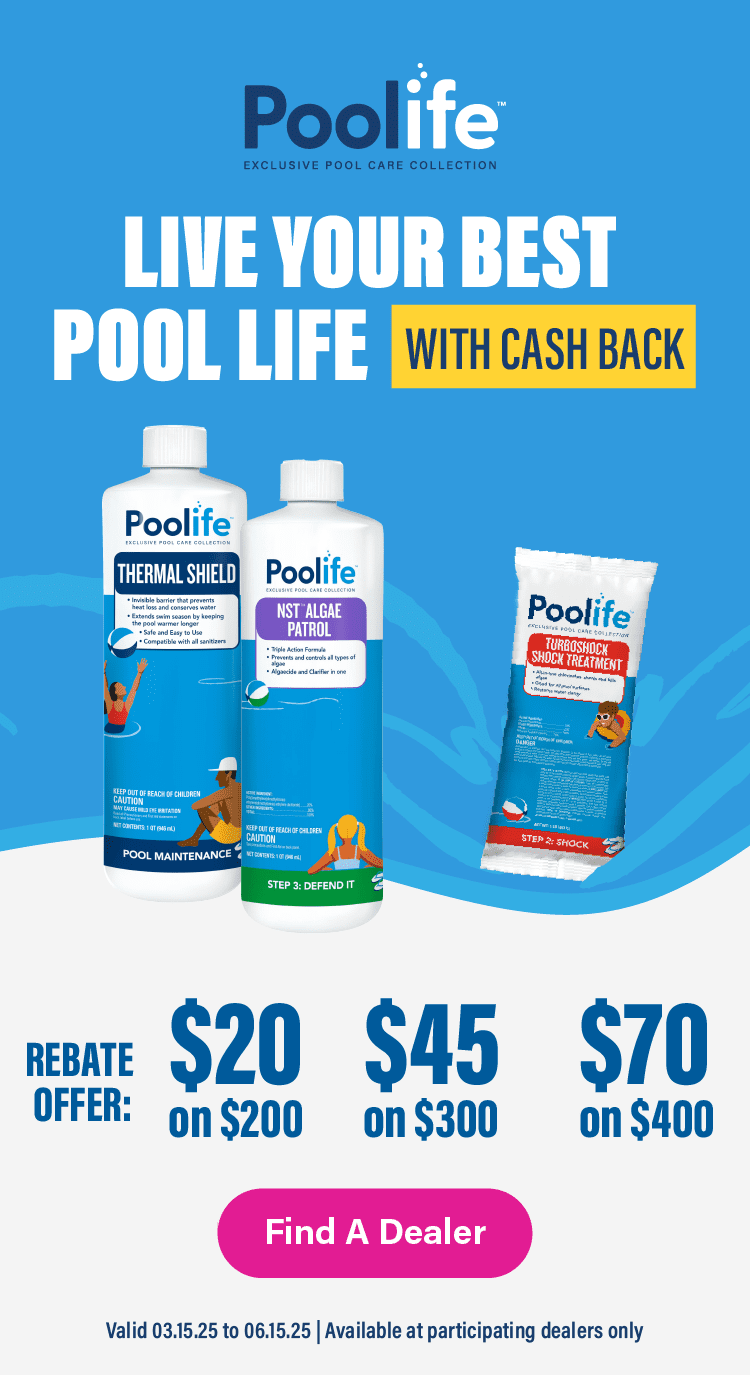Have you ever noticed a tinge of green invading the perfect blues of your swimming pool? If so, it’s time to consider a pool shock. But you may ask, is pool shock the same as chlorine? The answer is both yes and no. While it’s true that many pool shock treatments contain chlorine, it’s the way they function that sets them apart. Let’s take a dive into basic pool chemistry, shedding some light on pool chlorine vs shock and debunking any misconceptions that might have surfaced!
Swimming pools are a fantastic way to beat the heat and relax, especially during the summer months. However, maintaining a swimming pool is a different ball game and can be quite challenging for those who are new to it. It requires regular treatment, primarily with chemicals like chlorine and pool shock, to keep the water clean, clear, and safe for people to enjoy. So, in this comprehensive guide, Poolife™ will discuss in detail what pool shock and chlorine are, how they work, and when to use which!
Why Do We Use Chlorine in Pools?
Starting off with the basics, understanding the role of chlorine in pools is key. When introduced to your swimming pool, chlorine changes its form to become hypochlorous acid, a potent germ killer. This germ-killing agent is an archenemy of troublesome bacteria and many viruses that cause nasty illnesses. It reacts with the harmful microorganisms, disrupting their cell structure and thus neutralizing them in the water!
Besides its germicidal properties, chlorine also helps maintain pool water’s clarity, mainly by stopping algae growth. It’s vital to keep your pool water both clean and clear! Algae growth can cause pool water to take on a greenish hue and may even make the water cloudy, reducing visibility. Thankfully, you can avoid bad contaminants from ruining your pool fun by using chlorine, so you can get back to living your best Poolife!

What Exactly is Pool Shock and How Does It Function?
Using chlorine alone may not be enough to keep your swimming pool water clean, especially when the contamination level is high. Pool shock comes to the rescue in such situations. While chlorine is an indispensable agent in maintaining the pool’s cleanliness and keeping germs at bay, there are instances when a stronger solution, like pool shock, becomes essential. The discussion then circles back to the question: Is pool shock the same as chlorine? Although several pool shock products contain chlorine, these chemicals aren’t identical. Allow us to explain!
Consider pool shock as the superhero that swoops in to save the pool water when it’s been substantially contaminated. Its central role is to oxidize organic and inorganic matter in your pool, including bacteria, algae, sweat, and lotions. Additionally, a pool shock treatment can effectively reduce your pool’s combined chlorine levels, improving the effectiveness of free chlorine, which is the active form of pool sanitizer. Not only that, but it also helps to deal with chlorine-resistant germs and viruses, thus ensuring that the pool stays safe for use.
Pool Shock Vs Chlorine: When to Use Each?
Recognizing the differences between pool shock vs chlorine and understanding the question “Is pool shock the same as chlorine?” usually takes pool owners some time to figure out. Pool shock is often the choice when there’s been a substantial rain or bad weather event, as well as frequent and heavy pool usage. Both of these scenarios call for the regular application of pool shock. For best results, Poolife recommends using pool shock weekly to keep your pool clean and clear!
On typical days, it’s sufficient to maintain the recommended chlorine level in your pool (generally between 1.0 and 4.0 ppm) to fend off contamination and suppress bacteria and algae. However, if you anticipate any situation that could notably increase the contamination risk, switching to pool shock treatment is wise. In such cases, pool shock acts as an added defense against any potential threats to the water quality.
When comparing pool chlorine vs shock, remember there are different kinds of shock treatments, each suited for a specific situation. For instance, if your pool is heavily contaminated, a regular formula might not suffice. In such cases, stronger solutions like Poolife™ TurboShock™ Shock Treatment can be a better choice, as it contains a higher chlorine concentration.
What About Non-Chlorine Pool Shock?
While discussing pool chlorine vs shock, it’s vital to realize that not all shock treatments contain chlorine. Non-chlorine shocks, such as monopersulfate (MPS), can be a suitable alternative if you want your chlorine to concentrate solely on combating contamination. MPS can oxidize the waste material present in the pool without affecting chlorine levels, making it a perfect supplement to your standard chlorine treatment in maintaining a clean and healthy pool. In addition, MPS doesn’t contribute to chloramine formation, a by-product of chlorination that can cause irritation.

Poolife Is Your Trusted Source for Chlorine and Shocks
With the right products at your disposal, you can easily manage the cleanliness and safety of your pool. Understanding the different roles and uses of pool chlorine vs shock is helpful in making informed decisions based on the specific requirements of your swimming pool!
If you are stuck on the pool shock vs chlorine debate, just know that each has specific benefits and applications. The key is to identify your pool’s unique conditioning requirements and use these treatments wisely, adjusting according to the situation and necessity. Proper knowledge of these treatments can help ensure your swimming experience is both safe and enjoyable, with minimum risk of contamination. Spend less time maintaining your pool and more time enjoying it with Poolife’s effective chlorine and shock products today!


